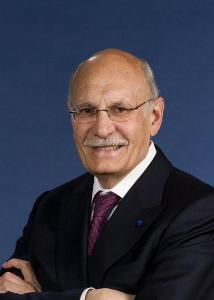Nov 12 2010
Diran Apelian, Howmet Professor of Mechanical Engineering at WPI and director of the University's Metal Processing Institute, will receive the 2010 National Materials Advancement Award from the Federation of Materials Societies during a ceremony at the National Press Club in Washington, D.C., on Dec. 8.
The National Materials Advancement Award recognizes individuals who have demonstrated outstanding capabilities and contributions in advancing the multidisciplinary field of materials science and engineering; the effective and economic use of materials in the marketplace and the application of materials developments to national problems and defense; and the development and implementation of national policy that furthers the impact of materials sciences and engineering on society.
 Diran Apelian is the Howmet Professor of Mechanical Engineering at Worcester Polytechnic Institute and the director of the WPI Metal Processing Institute.
Diran Apelian is the Howmet Professor of Mechanical Engineering at Worcester Polytechnic Institute and the director of the WPI Metal Processing Institute.
Previous recipients have included Paul Maxwell, science consultant to the U.S. House of Representatives Committee on Science (1985); William Baker, retired chairman of AT&T Bell Laboratories (1987); Rep. George Brown Jr., chairman of the House Science, Space and Technology Committee (1992); Mary Good, undersecretary of commerce (1996); Mildred Dresselhaus, director of the Office of Science in the U.S. Department of Energy (2000); and Jeffrey Wadsworth, president and CEO of Battelle Memorial Institute (2009). This is the first year two awards have been presented; the second will go to Richard Alkire, emeritus professor of chemical and biomolecular engineering at the University of Illinois, Urbana-Champaign.
Apelian will be recognized for his work to found and develop the Metal Processing Institute "as a prime example of building bridges between the industrial, government, and academic communities that bring the capabilities of materials science and engineering to bear on societal challenges, while always valuing the role of the human element." Notes Arden Bement, former director of the National Science Foundation, "his work is at the forefront of maintaining a U.S. leadership presence in manufacturing new products based on emerging advancements in materials science and engineering."
Apelian, a member of the National Academy of Engineering and an internationally recognized pioneer in metals research, has received numerous honors for his contributions to research and education in materials science and engineering in recent years. Earlier this year, he received the 2010 Robert Earll McConnell Award from the American Institute of Mining, Metallurgical, and Petroleum Engineers (AIME), one of the nation's oldest engineering societies.
In 2009 he concluded a term as the 52nd president of The Minerals, Metals & Materials Society (TMS), one of the four AIME member societies. Previously, he received the Acta Materialia Inc. J. Herbert Hollomon Award, the Brimacombe Prize, and the Bruce Chalmers Award from TMS and was one of six Anniversary Laureates at the TMS annual meeting, which marked the society's 50th anniversary. Apelian is one of only 100 living TMS Fellows.
He was the first person from WPI to be named a fellow of APMI International, the professional society for individuals involved in powder metallurgy technology and particulate materials. He is also an honorary member of the French Materials Engineering Society, a fellow of APMI and ASM, and a foreign member of the National Academy of Sciences of the Republic of Armenia. He received an honorary doctorate from Northwestern Polytechnic University in Xian, China, in 1997.
Apelian's pioneering work in molten metal processing, new aluminum alloys, and innovative casting techniques has resulted in more than 500 publications and 11 books, which he co-edited. The Metal Processing Institute, an industry-university alliance he founded at WPI in 1996, is dedicated to research in such areas as resource recovery and recycling, metal casting, and metal heat treating. With more than 90 corporate partners, it is the largest industry-university consortium in North America.
In addition to his leadership in metals processing, Apelian has long been an advocate for redefining engineering education and changing the popular perception of engineers. Over the past two years, he has co-taught "Grand Challenges," one of WPI's Great Problems Seminars, which are offered to first year students through the university's innovative first year experience. The seminar explores major challenges facing engineering in the 21st century using materials science and sustainability as a unifying theme. He is also co-editor of the book "Shaping Our World: Engineering Education for the 21st Century," expected to be released by J. Wiley & Sons in 2011.
Apelian received an undergraduate degree in metallurgical engineering from Drexel University and an Sc.D. in materials science from MIT. He worked at Bethlehem Steel's Homer Research Laboratories and then joined Drexel, where he ultimately was named vice provost. At WPI, he served as university provost from 1990 to 1996. Since then, he has focused on teaching and research in materials processing. WPI has twice honored him: in 2006 with its Board of Trustees' Award for Outstanding Research and Creative Scholarship, and in 2009 with its Chairman's Exemplary Faculty Prize.